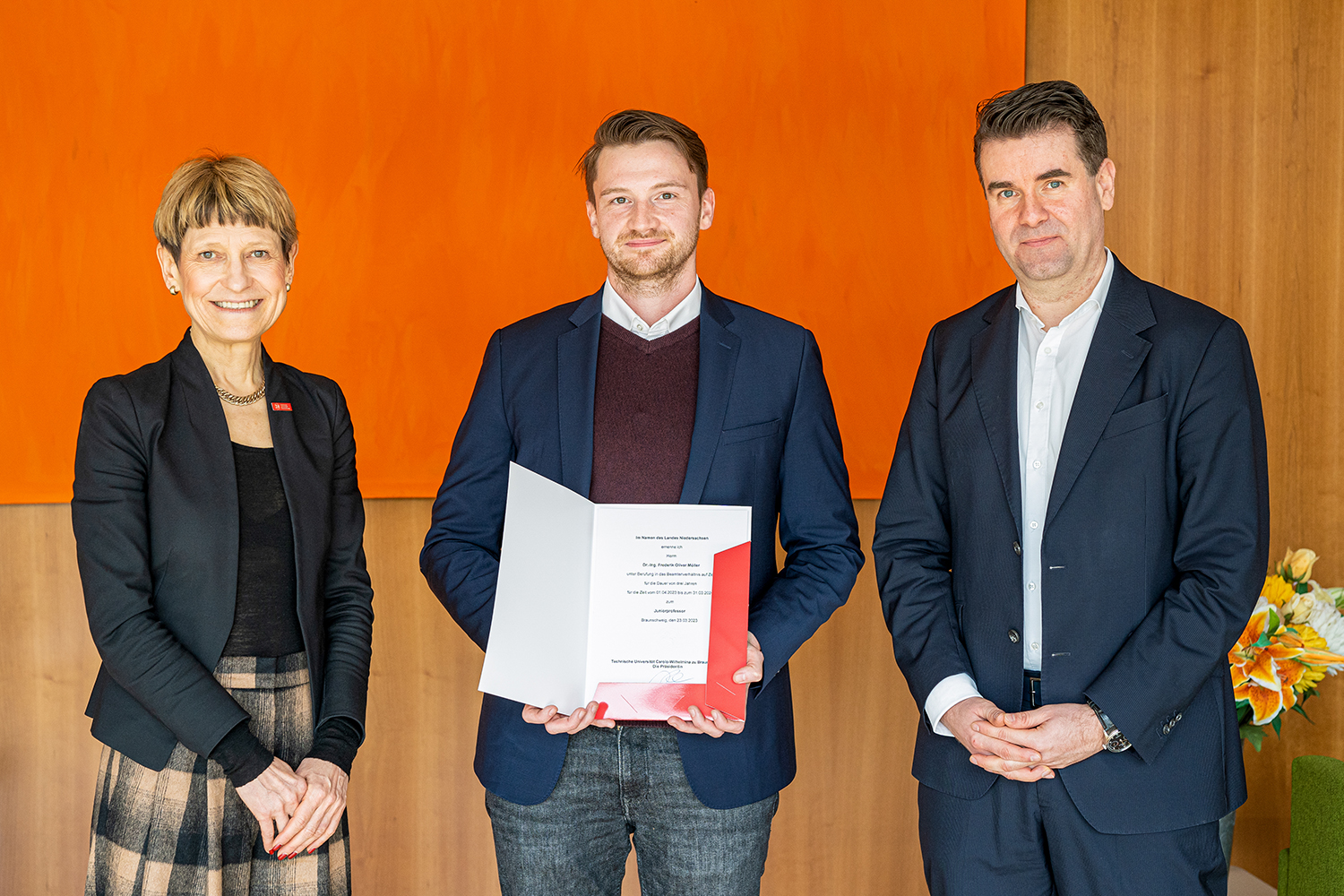How companies use data profitably Frederik Möller is a new assistant professor at the Institute of Business Information Systems
What data do I need? How much is my data worth? With whom do I want to share data? Dealing with data is the focus of the research of Frederik Möller, who has been the new assistant professor for Business Information Systems with a focus on Data-Driven Enterprise at TU Braunschweig since April 2023. He is particularly interested in how incentives can be created for data exchange between companies. In this interview, he tells us exactly what Data Ecosystems, Data Sharing and digital business models in logistics are all about.

Frederik Möller is a new assistant professor at the Institute of Business Information Systems. Photo credit: Kristina Rottig/TU Braunschweig
Welcome to TU Braunschweig, Professor Möller! Have you arrived well at our university?
There are always a few minor hurdles at the beginning of a new job. However, fortunately, these soon disappeared and I received a very warm and friendly welcome from my colleagues at TU Braunschweig.
Why did you choose TU Braunschweig?
I was already familiar with TU Braunschweig and some of its professors from research and publications in Business Information Systems. When a suitable vacancy came up, I applied immediately and am now looking forward to starting work at a university that is new to me.
How would you explain your work to a person not familiar with the subject?
In my work, I deal with a topic that affects all of us as people, both in our private lives and in companies, on a daily basis: the handling of data. I am particularly interested in how companies can use and share this data profitably. One example is global supply chains, where a lot of data is already exchanged to ensure smooth operations.
However, there is also a lot of data and information that is perceived as sensitive (for example, stock levels, product data) and the sharing of which involves high barriers. Part of my research is dedicated to precisely this phenomenon and investigates how incentives for data sharing between companies can be created in order to generate added value for all parties involved. It is also about highlighting the potential of co-creating value from data while finding ways to reduce the trust required through technology so that data can be shared confidently.
In your research, you deal with Data Ecosystems, Data Sharing and also digital business models in logistics. What exactly is that about?
This research is about the profitable and collaborative use of data in logistics and global supply chains. The products we use, order and buy every day have to get to us somehow, whether directly to our homes or to retailers. This means that every day, trucks drive through Germany, transporting these goods or raw materials from a source to a destination. If you now use different sensors (temperature or vibration, for example) to monitor the quality of the goods being transported, a variety of data is created that can be linked together.
This in turn can be used to develop various applications that can, for example, optimise routes not only according to the time required, but also according to other parameters, such as sustainability. These applications and new technologies around logistics data require successful business models, i.e. a combination of digital services that solve real problems for customers and at the same time can be implemented in an economically sustainable way.

Professor Frederik Möller at his appointment with TU President Angela Ittel and Professor David M. Woisetschläger. Photo credit: Madeleine Franke/TU Braunschweig
What made you decide to do research in this area?
I realised relatively early on that I like researching at the interface between technology and business. I’ve always enjoyed looking at the potential of data and digital technologies, but anchoring them through the business model context and also making them more applicable. Above all, I find it exciting that you can observe live in practice how these questions around the use of data are literally burning under people’s nails, so: What data do I need? How much is my data worth? With whom do I want to share data? In this field of tension between relevant practical problems and a well-founded and also theory-guided view from Business Information Systems, I feel I am in the right place.
What has been your best experience as a scientist so far? What excites you about your research?
My best moments were certainly the big milestones, such as the doctorate, but also receiving the call to TU Braunschweig. Not only because a milestone was reached, but also because, at least for me, really great events were organised by my former colleagues for these events. Apart from the personal perspective, I am always very happy when scientific works of young doctoral students in particular are successful. As a doctoral supervisor, you are part of this development, which can take a few years.
What constitutes good teaching for you?
In teaching, I follow a clear philosophy that I learned and adopted from my doctoral supervisor, Professor Boris Otto, because I am truly convinced of it: Namely, I try to convey the theoretical basics to the students in a well-founded way. However, I supplement these with many examples, for example from my own research career, from scientific literature or from “real life”. In my exercises, I work interactively as far as possible in workshop settings (for example, with A0 posters) and always on a problem from practice. That’s why I almost always have a practice partner for my courses.
This year, the students are investigating the use case Catena-X Automotive Network, which is precisely about the question: How can data exchange in the automotive supply chain be improved? I also think it is important that the event is a bit of fun for me as a teacher as well as for the students – that is why examples, an interactive exercise and also practical problems are the means of choice for me.
What would you like to give the students on their way?
We live in a world where the operational use of data is becoming increasingly important. Working and researching at this interface is not only exciting, but also maximally useful for your professional future. Being able to translate the competence between technology and business administration is central to degree programmes such as Business Information Systems and Technology-oriented Management and incredibly important in a rapidly growing data economy.
